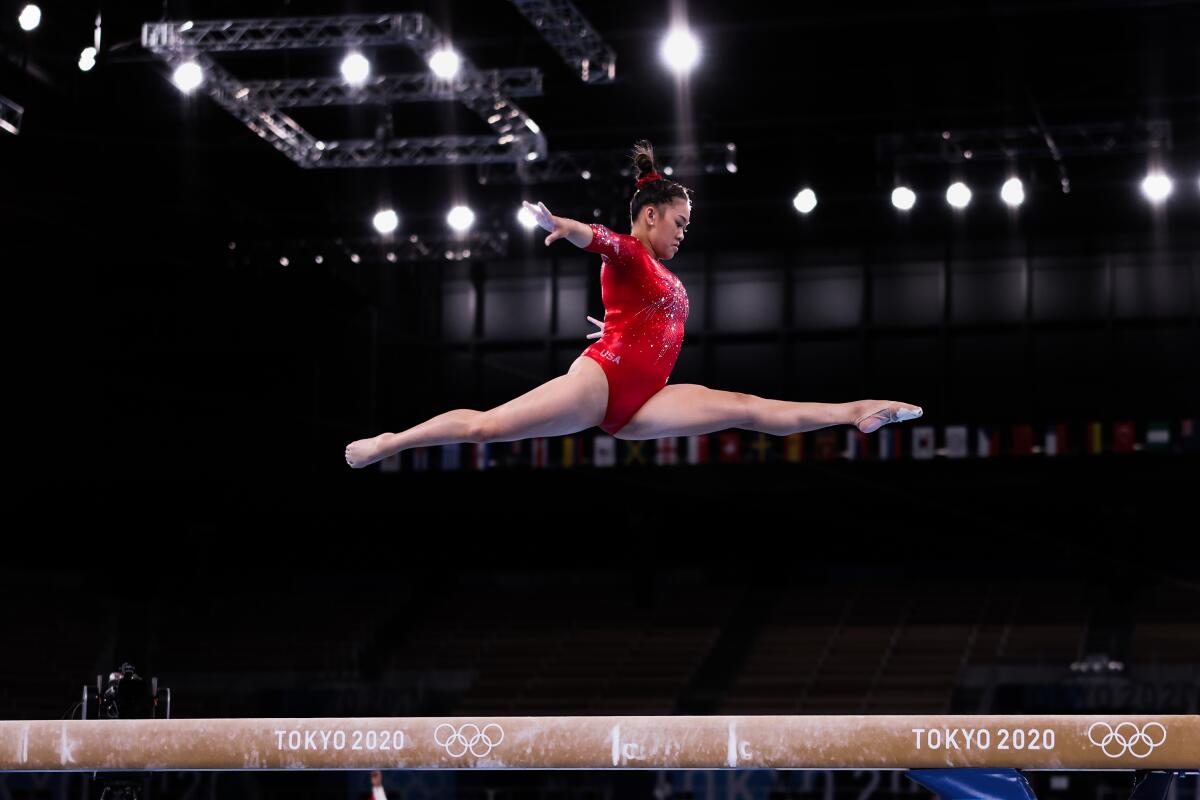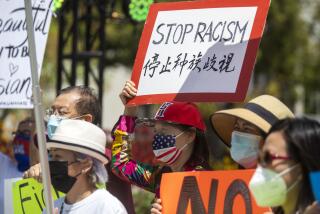Olympic gold medalist Sunisa Lee says she was pepper sprayed in racist attack in L.A.

Olympic gold medalist Suni Lee said she was pepper sprayed in a racist attack last month in Los Angeles.
In a recent interview with PopSugar, the gymnast said she was attacked while she and her girlfriends — all of Asian descent — were waiting for a ride. A group in a car speeding by started yelling racist slurs and a passenger sprayed Lee’s arm with pepper spray, she said.
“I was so mad, but there was nothing I could do or control because they skirted off,” Lee told the magazine. “I didn’t do anything to them, and having the reputation, it’s so hard because I didn’t want to do anything that could get me into trouble. I just let it happen.”
As the first Hmong American to represent the U.S. in the Olympics, the 18-year-old Lee astounded the world by winning a gold medal in the women’s all-around competition during the 2020 Summer Games in Tokyo. She is in her freshman year at Auburn University in Alabama and was in Los Angeles for rehearsals for an appearance on “Dancing With the Stars” when the incident occurred.
Lee was born Sunisa Phabsomphou to parents who immigrated to the U.S. from Laos.
Russell Jeung, an Asian American studies professor at San Francisco State and co-founder of Stop AAPI Hate, said Lee’s response is common among people who are targeted in a hate crime and feel like they let the incident happen or they were powerless.
“It’s not her fault,” Jeung said. “But she’s taking control and she’s challenging the racism by sharing the story. She may say the incident happened, but she’s taking control of the situation by speaking out.”
Anti-Asian hate crimes increased by 76% in Los Angeles County last year, according to a report from the county’s Commission on Human Relations, mirroring a disturbing trend in many other jurisdictions as physical and verbal attacks on Asian Americans and Pacific Islanders rose during the COVID-19 pandemic.
Of the 44 anti-Asian hate crimes reported in L.A. County in 2020, more than three-quarters involved physical violence — a marked increase from 58% in 2018, the commission’s report, released Wednesday, said.
In 2019, 25 anti-Asian hate crimes were reported.
The data in the report were compiled from the L.A. County Sheriff’s Department and more than 40 city police departments, including Los Angeles’, as well as several school police agencies and community organizations.
Hate crimes include violent crimes such as homicide and assault as well as some nonviolent crimes such as racial graffiti.
Stop AAPI Hate, a nonprofit group that tracks discrimination and attacks against Asian Americans and Pacific Islanders, said there were 9,081 total incidents nationwide involving physical assaults, civil rights violations, online harassment and other forms of discrimination or hate crimes. The organization tracked another 1,200 reports of incidents of anti-immigrant comments and other non-violent incidents nationwide from March 19, 2020, through June 30, 2021.
Lee is not the first Olympian to be the victim of an anti-Asian attack in California this year.
Martial artist Sakura Kokumai, 29, who also represented the U.S. in Tokyo this summer, was the victim of anti-Asian rant earlier this year while warming up before a run at Grijalva Park in Orange.
Kokumai, who was born in Hawaii and is Japanese American, shared videos from the incident on her Instagram feed, where a man aggressively leers and stomps toward her, shouting profanities.
“You’re a loser. Go home, you stupid b—,” he said. “I’ll f— you up.”
At one point, the man can be heard yelling “Chinese.”
Jeung said that when victims report these types of anti-Asian incidents, they take back some control from the perpetrators and soften the long-term trauma that will follow.
Myron Quon, executive director of Pacific Asian Counseling Services, sees the attack against Lee as a continuation of racism and misogyny in the U.S. directed at Asian American women.
“There’s this pervasive male privilege that seeks to make Asian American women feel subservient, Oriental and othered,” Quon said. “It doesn’t matter if you’re a doctor, a nail salon worker or an Olympian, you’re reduced to a subhuman thing.”
It’s important that the public take notice of these attacks against Asian Americans and immigrants, Quon said, especially after a white man shot and killed eight people in the Atlanta-area, including six Asian American women, earlier this year. Prosecutors initially said the shootings were not motivated by race, even though a survivor of the attacks reported the shooter said, “I’m going to kill all Asians.”
Quon said that what Lee experienced is a version of a hate crime focused on Asian American women who are simply congregating in public — in Lee’s case, waiting for a car on a Los Angeles street.
“Unfortunately, Asian American women have to be on high alert whenever they go out,” said Quon. “They can’t just go out like some white guy and not worry about their surroundings.”
Times staff writer Jaclyn Cosgrove contributed to this report.
More to Read
Sign up for Essential California
The most important California stories and recommendations in your inbox every morning.
You may occasionally receive promotional content from the Los Angeles Times.











